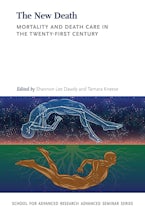- Home
- social science
- Food Sovereignty the Navajo Way
Food Sovereignty the Navajo Way
Cooking with Tall Woman
Contributions by Tall Woman and Augusta Sandoval
Published by: University of New Mexico Press
2018 Southwest Books of the Year
Around the world, indigenous peoples are returning to traditional foods produced by traditional methods of subsistence. The goal of controlling their own food systems, known as food sovereignty, is to reestablish healthy lifeways to combat contemporary diseases such as diabetes and obesity. This is the first book to focus on the dietary practices of the Navajos, from the earliest known times into the present, and relate them to the Navajo Nation's participation in the global food sovereignty movement. It documents the time-honored foods and recipes of a Navajo woman over almost a century, from the days when Navajos gathered or hunted almost everything they ate to a time when their diet was dominated by highly processed foods.
Charlotte J. Frisbie is professor emerita of anthropology at Southern Illinois University, Edwardsville.
"A great resource for anyone interested in learning about and cooking Navajo foods, both foods that are considered more traditional and those influenced by American foodways, such as the popular frybread."--Transmotion
"Frisbie serves up a thoughtful and humane study [. . .] a worthy summation of a distinguished career."--Southwest Books of the Year
"This book is wonderfully engaging. It is also a detailed and useful compilation of Navajo foodways and culture and is a significant addition to the library of works focused on the Navajo."--Western Historical Quarterly
"For a scholarly historical approach to Navajo food culture and preparation, you can't go wrong with Food Sovereignty the Navajo Way."--Edible Phoenix
"The main contribution of this book is as a storehouse for culinary wisdom gathered from Tall Woman and her family (with very rich footnotes containing additional stories and notes, as well as counter-information from other community members on some food uses)."--American Anthropologist
"Food ethnography at its best: fine-grained observations, careful descriptions of food preparation, an assessment of nutrition, and collaboration with Navajo consultants--all set in a larger framework that has historical depth."--Louise Lamphere, Journal of Anthropological Research
"Valuable as a source of information about changing Navajo foodways as well as about traditional ways of gathering and preparing locally available foods. Embeds the material within the larger context of a growing international political movement for food sovereignty. Among Navajos, as among many other indigenous peoples, some of the major causes of morbidity and mortality are related to the consumption of highly processed foods. Thus improving diets by using locally grown produce is at once an important political as well as public health measure. Frisbie's book is an important contribution to both of those developments."--Stephen J. Kunitz, author of Regional Cultures and Mortality in America
"Beautiful teachings of wellness from long-lost subsistence practices that are now finally being recognized as the keys to social health and global responsibility."--Steven Begay, Navajo Nation Council, practitioner of Navajo medicine
List of Illustrations
Acknowledgments
Introduction
Chapter One. An Overview of the Navajo Diet and Navajo Dietary Research
Chapter Two. Subsistence Practices in Tall Woman's Family
Chapter Three. Defeating Hunger by Making Something from the Earth: Cooking with Tall Woman
Introduction to the Recipes
Section One. Wild Foods: Animals, Birds, and Insects; Nuts; Plants, Including Greens, Bulbs, and Roots, Leaves, Seeds, and Wild Grasses; Wild Vegetables; Berries; and Other Fruit
Section Two. Possible Additives: Culinary Ashes, Salt, Sweeteners, Yeast, Baking Powder and Baking Soda, Shortening or Grease, Clay (Dleesh), Gravy, and Cheese
Section Three. Cultivated Crops
Section Four. Cake, Bread, Dumplings, and "Tamales"
Section Five. Meat ('Atsį')
Section Six. Stews, Soups, and Mushes ('Atoo')
Section Seven. Drinkable Substances (Dajidlá): Water, Juices, Coffee, Teas, Milk, Drinks Made with Milk or Water, and Creamers
Chapter Four. Reflections
Appendix A. The Commodity Food Program
Appendix B. A History of Restaurants in Chinle, Arizona
Notes
Glossary of Navajo Words
References
Index










